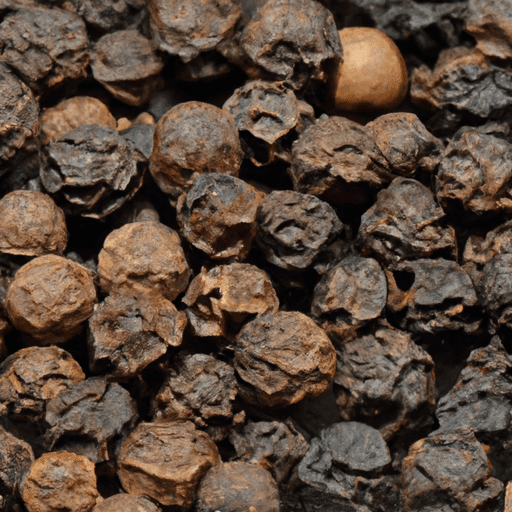The Versatile Whole Black Peppercorn: A Culinary Must-Have
Pepper is undoubtedly one of the most widely used spices in kitchens around the world. Whether in a fine-dining establishment or a cozy home kitchen, the distinctive aroma and flavor of whole black peppercorns can elevate any dish to new heights. But what exactly makes this humble spice such a culinary powerhouse?
The Taste that Packs a Punch
Whole black peppercorns are known for their bold and fiery flavor, with a pleasant spiciness that excites the taste buds without overwhelming them. This quintessential spice offers a complex taste profile, combining earthiness, warmth, and a subtle hint of citrus. Each little black ball of flavor provides a gentle heat that can range from mildly pungent to tongue-tinglingly hot. Its versatility allows it to effortlessly enhance both savory and sweet dishes, making it a staple in countless recipes.
In the Kitchen: Common Uses
Whole black peppercorns are often used in conjunction with salt to season dishes, forming the foundation of basic culinary practices. However, their uses go far beyond that. Here are a few common ways this magnificent spice can add depth and character to your cooking:
- Spice Rubs and Marinades: Crushed or ground whole black peppercorns are a primary ingredient in spice rubs and marinades, providing a balanced and intense flavor.
- Sauces and Dressings: Adding a pinch of freshly cracked black pepper to sauces and dressings imparts a delightful zing, enlivening the dish.
- Soups and Stews: Whole black peppercorns are a key component in creating aromatic broths, hearty stews, and robust soups. The slow simmering allows them to infuse the liquid with their distinct flavor.
- Grinding Fresh: Grinding whole black peppercorns just before using them ensures the maximum flavor and aroma, transforming even the simplest of dishes into something extraordinary.
Nutritional Value: A Surprising Bonus
Beyond its remarkable flavor, whole black peppercorns also offer various nutritional benefits. Rich in antioxidants and essential minerals like manganese, iron, and vitamin K, they contribute to overall wellness. Additionally, pepper aids in digestion, stimulates metabolism, and may possess anti-inflammatory properties. Though the amount of pepper consumed in a single dish may be small, every pinch adds a little health boost to your meal.
A Spice with a Long and Storied History
Black pepper has been treasured for centuries, both for its culinary and medicinal properties. In ancient times, its rarity and demand made it a valuable commodity, often referred to as “black gold.” The spice trade routes that connected the East and the West were heavily influenced by the pursuit of this prized spice.
Today, whole black peppercorns are sourced primarily from India, Vietnam, Indonesia, and Brazil. These round berries grow on flowering vines, which are handpicked when they reach full maturity but are still green. They are then sun-dried, which causes the outer layer to darken and wrinkle, resulting in the characteristic black peppercorns we know and love.
Fun Facts about Whole Black Peppercorns
- Did you know that before refrigeration, pepper was extensively used as a preservative for meats? Its antibacterial properties helped delay spoilage, making it an essential addition to medieval kitchens.
- The term “peppercorn rent” comes from the practice of collecting rent in the form of a handful of peppercorns, reflecting its value and importance throughout history.
- White, green, and red peppercorns all come from the same plant as black peppercorns. The color is determined by the stage of ripeness, drying process, and removal of the outer layer.
Final Thoughts
Whole black peppercorns, with their robust flavor, incredible versatility, and rich history, truly deserve a place in every kitchen. Their ability to transform ordinary dishes into extraordinary creations makes them an indispensable spice for any aspiring home cook or professional chef. So go ahead, explore and experiment with this culinary treasure, bringing a touch of fiery zest to your culinary creations!
Whole Black Peppercorn
Origin: Whole black peppercorn comes from the plant Piper nigrum, which is native to India. It is one of the most widely used spices in the world and has been cultivated for thousands of years.
Common Uses: Whole black peppercorn is commonly used as a spice in cooking and is a staple in many cuisines around the world. It is often ground into a fine powder and used to enhance the flavor of various savory dishes, including meats, vegetables, soups, and sauces.
Nutritional Benefits: Black peppercorn is not only used for its flavor but also offers some nutritional benefits. It contains a compound called piperine, which has been shown to have potential antioxidant and anti-inflammatory properties. It is also a good source of vitamins A, C, and K, as well as minerals like calcium, potassium, and manganese.
Unique Properties: Whole black peppercorn has a sharp, pungent flavor with a slight heat. When ground, it releases volatile oils that give it its distinct aroma. Interestingly, the piperine found in black peppercorn can enhance the absorption of certain nutrients in our body, such as curcumin in turmeric.
Historical Significance: Black peppercorn has a rich history and used to be considered a luxury spice. During ancient times, it was highly prized and was even used as a form of currency. The spice trade played a significant role in shaping world history and sparked exploration and colonization. Peppercorns were one of the most sought-after spices, which led to the discovery of new trade routes and the establishment of empires.




Use the share button below if you liked it.
It makes me smile, when I see it.